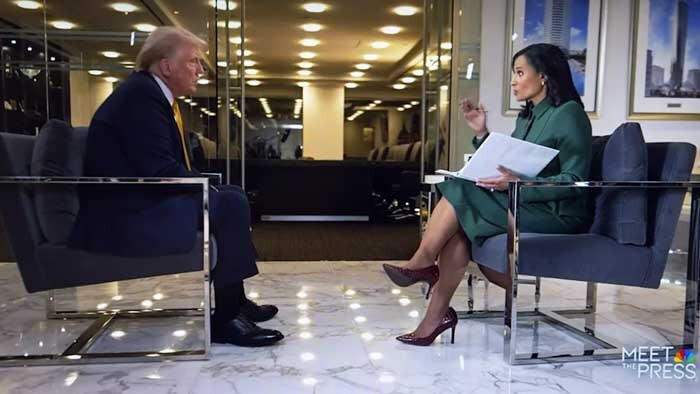Posted by - News Staff \
\
Dec 9 \
Filed in - Politics
\
Former President Trump
No Salary & Pension
\
447 views \
0 reviews
Donald Trump in conversation with NBC journalist Kristen Welker of Meet The Press.
DLNews Politics:
In a political landscape where fiscal responsibility often seems elusive, President Donald Trump has made headlines by pledging to forgo both his presidential salary and pension during his second term. In an interview on NBC's "Meet the Press" with Kristen Welker, Trump stated, "I will not accept the salary... I am foregoing a whole lot of money." This move, aimed at curbing government spending, has sparked discussions about the financial sacrifices of American leaders.
The U.S. Constitution mandates that the president receive compensation, currently $400,000 annually. However, Trump has chosen to donate his salary to various government agencies. In a 2015 campaign speech, he declared, "As far as the salary is concerned, I won't take even $1. I'm giving up my salary if I become president."
This act of generosity places Trump among a select group of presidents who have declined their salaries. Herbert Hoover and John F. Kennedy, both independently wealthy, donated their presidential earnings to charity. Hoover, a successful mining engineer, split his salary between various organizations and his staff's wages. Kennedy, a member of a prosperous family, directed his presidential and congressional salaries to charitable causes.
Trump's decision to forgo his pension is equally notable. Under the Former Presidents Act of 1958, ex-presidents are entitled to a pension equivalent to a cabinet secretary's salary, currently $226,300 annually. By declining this benefit, Trump underscores his commitment to reducing government expenditures.
It's worth noting that Trump's fortune, estimated at around $5.5 billion by Forbes, provides him with financial flexibility. This substantial wealth enables him to make philanthropic gestures without financial strain.
In a political era where public service and personal gain often intersect, Trump's actions serve as a reminder of the potential for leaders to prioritize national interest over personal benefit. Whether one views these decisions as genuine altruism or strategic symbolism, they undeniably contribute to the ongoing dialogue about the role of individual wealth and sacrifice in public office.

![]() \
\
Share this page with your family and friends.